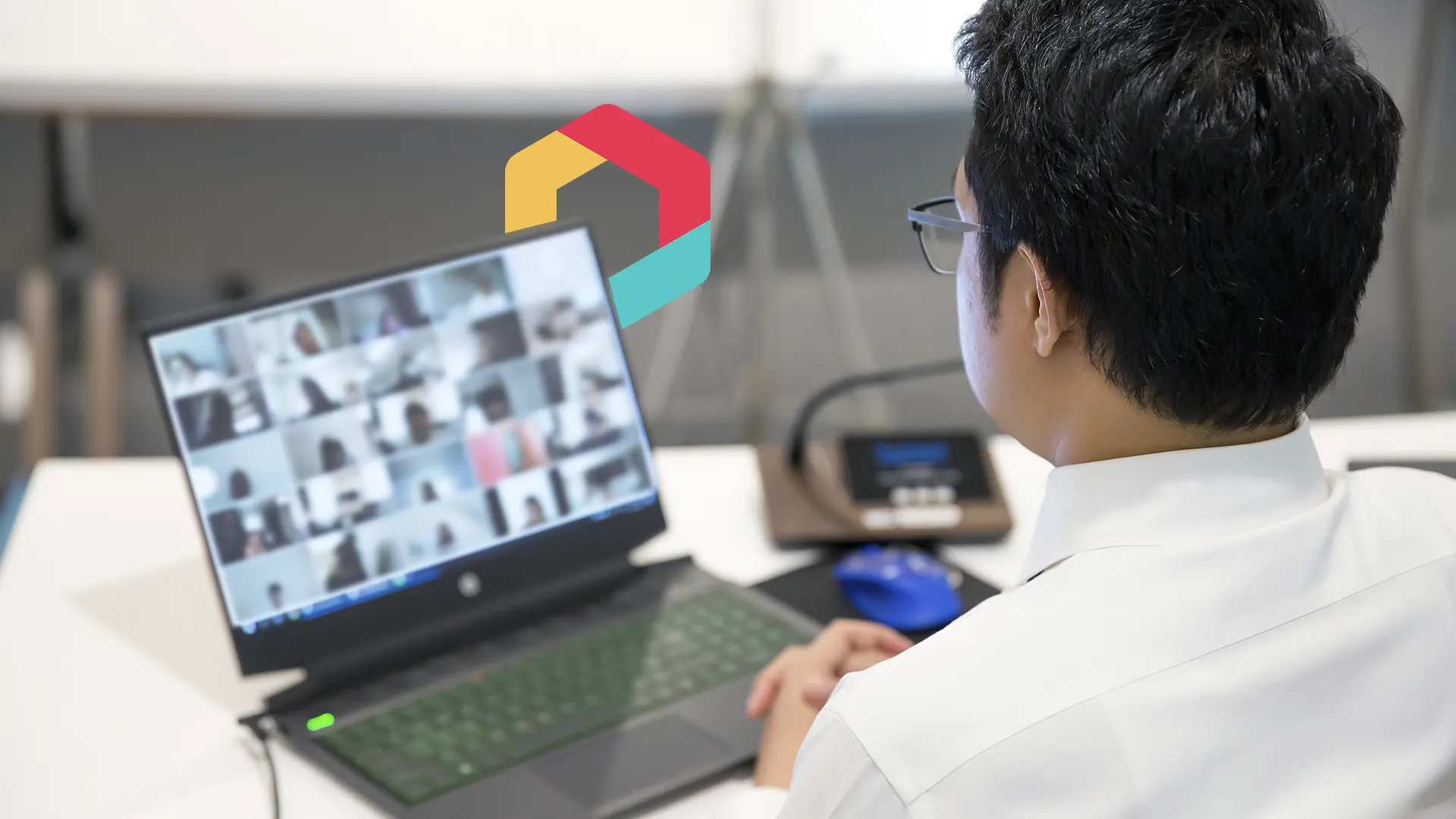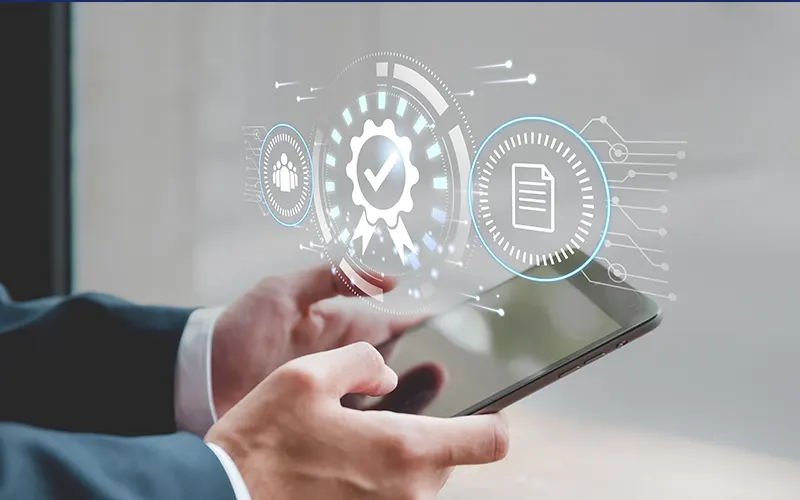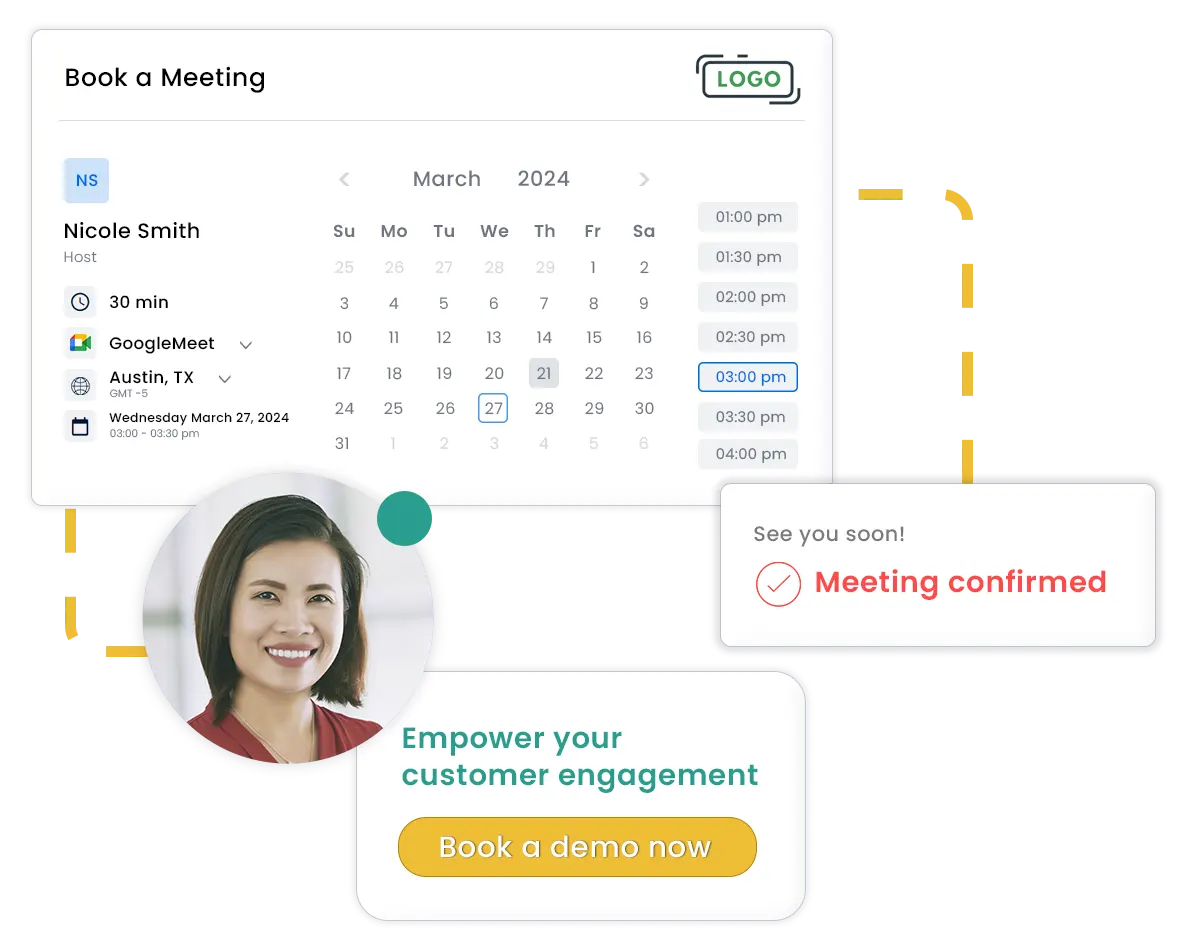Sales reps spend only 28% of their week actually selling — the rest is lost to admin work, CRM updates, and follow-ups as Salesforce reports. That’s a huge productivity gap, and it’s where AI sales agents can make a big difference.
For teams using Salesforce, the right AI tools can automate scheduling, prep, note-taking, and outreach — giving reps more time to focus on their meaningful work. In this guide, we’ll break down some of the top Salesforce AI sales agents, what they’re best at, and how to choose the right one for your team.
Key Takeaways
Among the top Salesforce AI sales agents that reps and SRDs can use to enhance their work are:
- SUMO Scheduler: Best Salesforce-native AI engagement assistants that automate meeting booking, prep, note-taking, and follow-ups, syncing all data directly to CRM.
- Salesforce Einstein agents offer powerful AI features for sales, like scheduling, predicting outcomes, identifying top leads, and capturing key insights from calls. Though compared to plug-and-play tools, they require more admin setup.
- Gong, Outreach & Apollo.io: For finding new prospects with AI.
- Clari: For your overall revenue picture and how healthy your sales deals are.
- Regie.ai & Lavender: For email sequence management directly integrated with Salesforce.
- Seamless.AI: For getting up-to-date customer information and logging your data on the fly.
Salesforce AI for Sales: Cutting Through the Buzz to Real Impact
You might have heard of Salesforce Einstein backing Sales GPT and Agentforce, which bring agentic AI into the core of Salesforce workflows.
The bigger idea is that you can communicate with your CRM like you do with an AI chat. You can ask it to pull information about a client, write an email, schedule appointments, or auto-update CRM records. Those actions you used to do manually now take seconds—just by requesting a chat to do so.
Launched in 2023 and 2024, Salesforce AI products generated a lot of buzz. But for many sales teams, turning that buzz into daily value has been slow. Their features are promising, yet they still require setup, configuration, and training to get the most value.
That’s why, in this post, we’ll focus on Salesforce AI sales agents that are easier to adopt. They work out of the box after integration, require minimal admin setup, and offer a deeper level of assistant-like functionality, not just quick task automation.
What Are AI Sales Agents in Salesforce?
In the context of Salesforce, AI sales agents are intelligent software assistants added to Salesforce CRM to support sales teams in their work.
By use case, they can be:
- AI Agents for Sales & SDR CRM Tasks
- AI Agents for Lead Prospecting & Engagement
- AI Agents for Lead Scoring
- AI Agents for Revenue Forecasting
- AI Agents for Sales Coaching
- AI Agents for For Insights Capture
By integration type, they come as
- Native in Salesforce, e.g. Einstein GPT – built directly by Salesforce and tightly integrated into the platform.
- Native or built on Salesforce and added via managed packages, e.g. SUMO Scheduler – solutions developed on the Salesforce platform and installed directly into the org.
- 3rd-party integrated add-ons connected via API or AppExchange, e.g. Gong, Drift, Clari – external platforms that sync or push data into Salesforce using integrations.
These tools automate your manual tasks like scheduling meetings, logging CRM data, and writing follow-ups, or help you with small yet essential routines like generating a meeting summary, drafting a meeting agenda, or researching a lead. They can help you with decision-making too, using smart algorithms to prioritize your lead pipeline or forecast revenue.
On the surface, their common goal is to save your time, automate those manual tasks you can’t report on with KPIs, and make your CRM a smarter and more pleasant place. In reality, these AI agents help you move deals forward more efficiently.
5 Ways AI Sales Agents Benefit Salesforce Teams
1. Free Up Time Where It’s Actually Wasted
Most reps spend 72% of their time not selling, according to Salesforce’s own State of Sales report. They do admin, manual CRM updates, and in-between meeting coordination. When teams are busy with admin, they can’t focus on what matters most: engaging with customers.
AI agents handle scheduling, call logging, and note-taking automatically — giving reps hours back each week to focus on customers.
2. Help Reps Stay on Top of Follow-Ups
There’s a common belief — and you may know it from your work — that almost 80% of deals require 5+ follow-ups. For busy reps having to explain the same thing over and over again, this means a risk of developing follow-up fatigue, dropped conversations, and little personalization. Yet, AI agents don’t forget. They can automatically draft and send personalized follow-ups, schedule nudges, and even remind reps when a lead has gone cold.
3. Turn Meeting Chaos into Clean CRM Data
Sales calls are full of gold — objections, buying signals, decision timelines — but most of it gets lost or summarized poorly. AI agents can record, transcribe, and extract action items from calls, then log them into the right Salesforce records. No more “rep said vs. what’s in CRM” mismatch.
4. Make Forecasting Less Gut, More Data
Sales leaders still rely heavily on rep intuition and manual inputs for forecasting which leads to surprises. AI agents can analyze historical patterns, engagement data, and pipeline behavior to suggest more realistic close dates and risk flags. According to McKinsey, AI-based forecasting improves accuracy by up to 50%.
5. Reduce Onboarding Time for New Reps
New reps often spend weeks learning CRM workflows and sales playbooks. With AI agents handling much of the routine (like pre-call prep, meeting notes, or data entry), new hires can focus on learning the product and customer needs — not Salesforce navigation. That can shorten ramp-up time significantly.
Key Features of Salesforce AI Sales Agents
Salesforce AI sales agents are tools that plug into your Salesforce CRM to help reps work faster and smarter. They’re often third-party apps that add features Salesforce doesn’t have out of the box or those that require complex configuration. Here’s a breakdown of the key capabilities to look for when evaluating Salesforce AI assistants for sales teams.
Sales & SDR CRM Tasks
Goal: Reduce manual work for sales reps and SDRs inside Salesforce.
Typical features include:
- AI scheduling & meeting booking
- Pre-call planning
- Task and activity creation
- Note logging and summaries
- Record lookups and data answers
Lead Prospecting & Engagement
Goal: Help SDRs and inbound teams identify and engage qualified leads faster.
Typical features include:
- Automated lead qualification
- Outreach sequencing
- Email drafting
- Engagement tracking
- Smart lead routing
Lead Scoring
Goal: Prioritize leads based on likelihood to convert.
Typical features include:
- Predictive lead scoring
- Prioritized lead views
- Dynamic model updates
- Suggested next steps
Revenue Management & Forecasting
Goal: Improve pipeline visibility and forecast accuracy.
Typical features include:
- Predictive deal scoring
- AI-generated forecast rollups
- Opportunity risk alerts
- Trend-based forecast adjustments
Sales Coaching
Goal: Help managers improve rep performance using real data
Typical features include:
- Conversation and behavior analysis
- Coaching recommendations
- Performance tracking by rep or team
- Identification of skill gaps
Insights Capture
Goal: Capture and analyze data from sales conversations, emails, and meetings
Typical features include:
- Call transcription
- Keyword and topic detection
- Action item extraction
- Automatic logging to CRM
- Searchable conversation history
Evaluation Criteria: What to Look For in an AI Sales Agent Software
Salesforce Integration: May not be an evident factor for reps, but it’s crucial for admins who set up infrastructure and leaders planning long-term growth. We assessed how each AI agent connects with Salesforce — whether built-in, native or third-party — and how well it handles lead updates, call logs, tasks, and data flow to minimize manual CRM work.
Rep Productivity Features: We looked at the AI features that directly impact sales reps daily tasks. The more routine AI handles, the more time rep can spend on selling.
Use Case Fit: Most AI agents are made to deliver the most value at a specific area — like lead engagement, pipeline management, or revenue forecasting.
Different Team Sizes Fit: If a tool is friendly for different sales team structures in terms of licensing, admin and permission controls, and workflow customization.
Ease of Use: We considered if the agent is intuitive for non tech users based on UI, demo videos and user feedback.
Reviews & Ratings: We considered user reviews on platforms like G2 and Salesforce AppExchange to understand real-world performance.
10 Best AI Sales Agents For Smarter Selling in Salesforce
| Solution | Use Case | Integration Type | Key Features |
|---|---|---|---|
| SUMO Scheduler | AI engagement & meeting automation | ✅ Native Salesforce (managed package) | Meeting & event booking, AI self-scheduler, AI agenda prep, call notes, post-call actions, reminders, CRM syncing |
| Salesforce Einstein | Forecasting & lead scoring | ✅ Native Salesforce | Predictive lead scoring, opportunity insights, pipeline trend analysis |
| Einstein Conversation Insights | Insight capture & coaching | ✅ Native Salesforce | Call transcription, keyword detection, action item capture, multilingual support |
| Gong | Sales coaching & deal intelligence | 3rd-party via AppExchange | Conversation analytics, deal signals, coaching insights, sales activity tracking |
| Outreach | Sales execution & prospecting | 3rd-party integration | Email sequencing, task automation, CRM activity sync, AI engagement analytics |
| Clari | Revenue intelligence & deal health | 3rd-party integration | Forecast dashboards, pipeline health scores, AI deal insights |
| Apollo.io | Prospecting & AI enrichment | 3rd-party integration | Contact discovery, email automation, CRM enrichment, lead scoring |
| Regie.ai | AI email sequencing & co-pilot | Salesforce-integrated (API/AppEx) | AI-generated email campaigns, sequence builder, CRM syncing |
| Lavender | Real-time AI email coaching | 3rd-party (Chrome plugin) | Tone analysis, deliverability feedback, in-email writing coaching |
| Seamless.AI | Real-time prospecting & enrichment | 3rd-party integration | Live lead data, intent signals, CRM sync, Salesforce record enrichment |
1. SUMO Scheduler — Best for AI Sales Engagement & Meeting Automation
Use Case: Enterprise-to-mid teams using Salesforce
SUMO is the industry-leading provider of AI customer engagement solutions natively built on Salesforce. It includes a suite of AI assistants that help sales reps save time on tasks like scheduling, lead research, meeting notes logging and followup writing—directly in Salesforce.
Beyond time saving, reps benefit through engagement automation. You can pre-qualify leads when they book a meeting on your site and smartly route them to the right sales rep. You can generate meeting agendas and gather public info about a prospect or company in seconds. You can also auto-capture action items during calls and follow up on them.
All of this ultimately increases your pipeline and close rates without adding any extra burden, so you have more time and energy to focus on selling.
SUMO’s AI sales assistants include:
- AI Scheduler (built on Agentforce): books and routes meetings via AI website chat or portal
- Pre-Call Planner: browses public info and your records for meeting agenda, talking points, and discovery questions
- AI Note Taker: logs transcripts, meeting summaries and action items to CRM records
- Follow-Up Assistant: automates email follow-up writing
Trusted by organizations in education, healthcare, financial services, government, and nonprofits, SUMO delivers time savings, improved productivity, and more personalized customer journeys.
Pricing
On-demand
Learn how SUMO automates your meeting hustle and helps you move deals forward.
2. Salesforce Einstein — Native AI for Forecasting & Lead Scoring
Salesforce Einstein is the AI layer built into the Salesforce platform. It was introduced in 2016 and offers a range of AI tools across Sales Cloud, including lead scoring, opportunity scoring, activity capture, and forecasting. Since it is native to Salesforce, it works directly with your CRM data without external integrations.
Sales reps use Einstein Lead and Opportunity Scoring to prioritize work based on AI predictions. Sales leaders use Einstein Forecasting to improve forecast accuracy with models that learn from historical pipeline behavior. These tools reduce guesswork, surface important deals, and highlight risks early in the sales cycle.
Key Features:
- Native lead and opportunity scoring
- AI-generated sales forecasts
- Activity capture from Gmail/Outlook
- Trend-based insights in pipeline views
- Transparent scoring explanations
Pricing
Included in some Sales Cloud editions or available as an add-on. Requires Sales Cloud Enterprise or Unlimited edition for full features.
3. Einstein Conversation Insights (ECI) — Native AI for Insights Capture
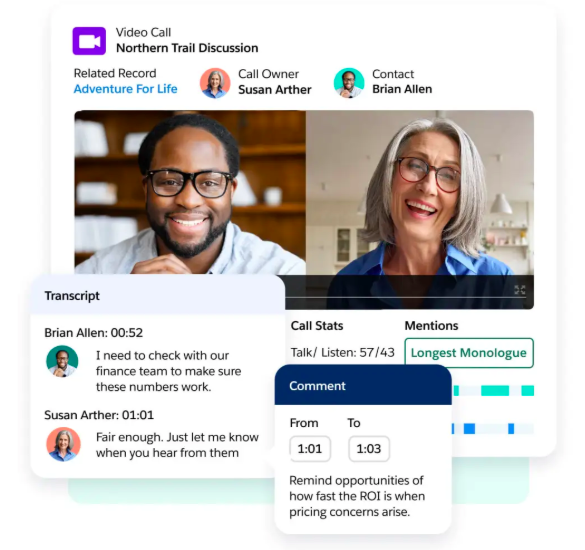
Einstein Conversation Insights is a Salesforce-native AI feature that records, transcribes, and analyzes sales calls. It was released in 2021 as part of Sales Engagement (formerly High Velocity Sales). ECI uses AI to detect keywords, next steps, competitor mentions, and objection handling in recorded calls.
You can use ECI to review rep performance, identify coaching moments, and analyze buyer trends. Auto-logged notes, searchable transcripts, and reminders for follow-ups based on calls provide valuable insights into your sales process. It works best with integrated dialers and is accessible through the Salesforce UI.
Key Features:
- Call recording and transcription
- Keyword tracking (e.g., pricing, competitors)
- Coaching dashboards and playback
- Automatic note capture to CRM
- Works with Sales Engagement and Einstein Activity Capture
Pricing
Available in Salesforce Sales Engagement licenses. Requires Salesforce Enterprise or higher.
4. Gong — Best for AI Sales Coaching & Deal Intelligence
Gong is an AI sales agent for revenue intelligence that integrates with Salesforce and communication tools like Zoom, Teams, and Gmail. It uses AI to analyze conversations and surface deal risks, rep performance trends, and pipeline gaps.
Its value accumulates over time since the more data you have, the more insight you get into why deals close or stall. You can analyze your own calls, understand buyer behavior, and plan next steps for particular leads or campaigns. Gong syncs all insights back to Salesforce to improve forecasting and pipeline visibility without manual updates.
Key Features:
- Conversation intelligence with AI analysis
- Deal risk alerts and trend detection
- Coaching dashboards for managers
- CRM sync with activity and insights
- Integrates with Zoom, Teams, Salesforce
Pricing:
Starts around $100–$130/user/month. Requires minimum seat commitments.
5. Outreach — AI for Sales Execution & Prospecting
Outreach is a sales execution platform that combines prospecting automation with AI-driven coaching. Founded in 2014, it integrates with Salesforce and platforms like LinkedIn, Gmail, and ZoomInfo. Outreach includes an AI assistant (Kaia) that provides live call insights, summarizes meetings, and helps guide next steps.
Reps use Outreach to manage outbound cadences, while Kaia supports them with real-time prompts and follow-up suggestions. You can track rep activity, sequence performance, and engagement rates. Outreach syncs activity data to Salesforce, so no manual logging needed.
Key Features:
- Sequencing for multichannel outreach
- Call and email performance analytics
- Real-time objection handling guidance
- Salesforce CRM sync
Pricing:
Starts at $100–$150/user/month depending on feature set. Custom pricing for enterprise.
6. Clari — Best for Revenue Intelligence & Deal Health
Clari is a revenue operations platform that provides forecasting, pipeline visibility, and deal inspection. Founded in 2012, Clari connects with Salesforce to extract sales activity, analyze deal progression, and highlight risks using AI models. It helps organizations run forecast calls and identify gaps in pipeline coverage.
Sales teams use Clari to assess which deals are on track and which need attention. It centralizes sales activity from Salesforce, email, calendar, and call tools into a single view. Clari’s AI models are trained on historical win/loss data and rep behavior.
Key Features:
- AI-based revenue forecasting
- Deal and pipeline inspection
- Risk scoring and sales activity analysis
- Sales rep coaching insights
- Integrates with Salesforce, Gmail, Zoom, and more
Pricing:
Custom pricing. Often starts around $80–$120/user/month for core revenue teams.
7. Apollo.io — Prospecting with AI Enrichment
Apollo.io is a sales AI platform that helps reps with contact discovery and outbound automation. Founded in 2015, Apollo includes a large database of B2B contacts and a Chrome add-on that works with Salesforce. It also uses AI to score leads, suggest contacts, and track engagement.
Best-fit for small teams focused on outbound, Apollo lets you build prospect lists, add data to your CRM records, and launch email sequences. Its AI tools help prioritize leads and improve email targeting.
Key Features:
- B2B contact database with verified emails
- Salesforce sync for lead enrichment
- Email sequencing and tracking
- Lead scoring and AI contact suggestions
- Chrome extension for LinkedIn
Pricing:
Free plan available. Paid plans start at $39/user/month. Custom pricing for large teams.
8. Regie.ai — Salesforce-Integrated AI Email Sequencing Co-Pilot
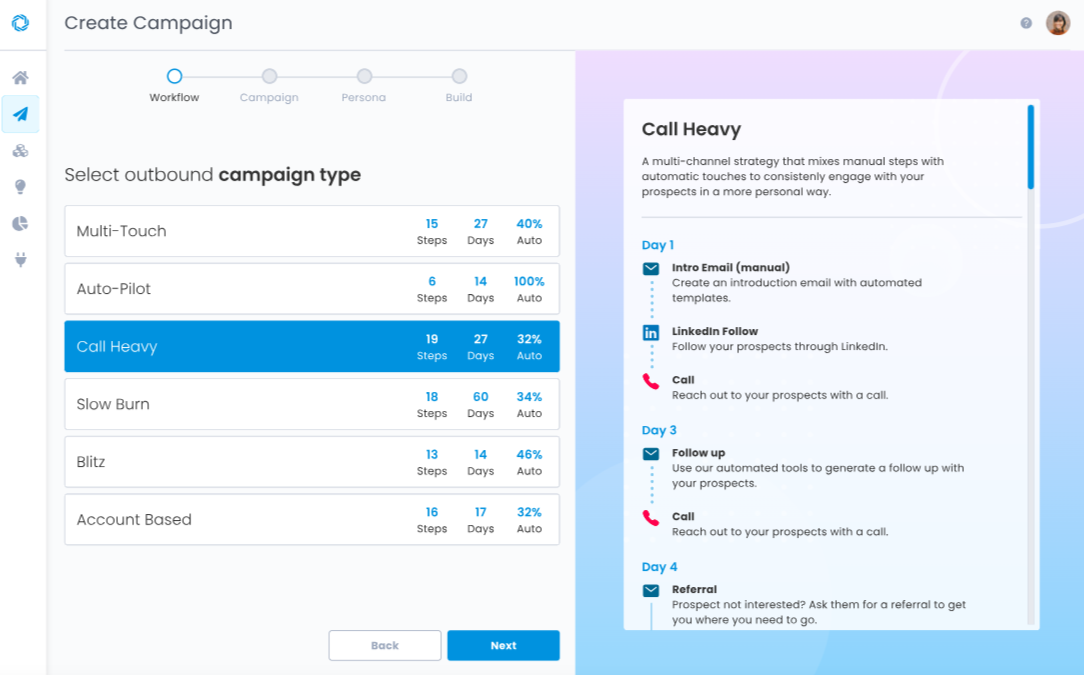
Regie.ai is a generative AI tool for outbound sales messaging and sequences. Founded in 2021, it integrates with Salesforce and platforms like Outreach and Salesloft. With Regie, you can automate personalized messages and full sequences based on personas, product value, and your CRM context.
Reps use Regie to speed up cold outreach while maintaining message quality. Sales leaders use it to manage content consistency across teams. You can run A/B testing and define your writing style guidance to improve reply rates.
Key Features:
- AI sequence and email generator
- Salesforce and Outreach integration
- Persona-based personalization
- Message scoring and version control
- Content library management
Pricing:
Starts around $29–$89/user/month depending on feature tier.
9. Lavender — Real-Time AI Email Coach for Outbound Campaigns
Lavender is a real-time AI writing assistant for sales emails. Launched in 2020, it plugs into Gmail and Outlook and integrates lightly with Salesforce. Lavender scores email drafts, offers suggestions to improve tone, structure, and clarity, and helps reps write faster with better results.
Among key advantages, you can get coaching while you follow up. It helps improve reply rates by catching filler, jargon, and weak CTAs. And surely, you can analyze team email performance and share writing feedback.
Key Features:
- Real-time email scoring and suggestions
- Personalization prompts
- Integrates with Gmail, Outlook, Salesforce
- Coaching dashboards and team analytics
- Chrome extension
Pricing:
Free version available. Paid plans start at $29/month per user.
10. Seamless.AI — Real-Time Prospecting & Data Enrichment
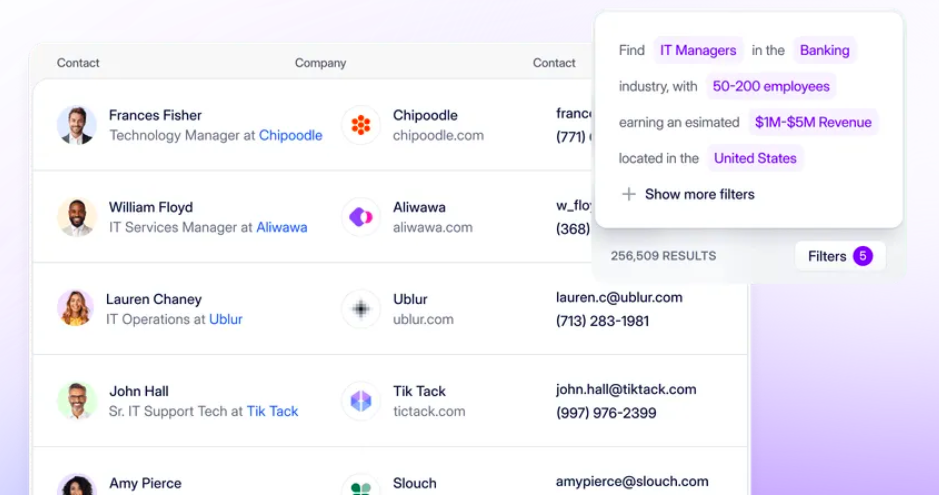
Seamless.AI is a B2B data enrichment platform that helps reps find emails, phone numbers, and firmographics in real time. Founded in 2015, it offers a Chrome extension that works inside Salesforce. You can import all contact data directly into leads, contacts, and campaigns with just one click.
Sales teams use Seamless to build accurate lead lists faster. It makes your Salesforce records more complete with over 100 data points and bulk imports preventing you from duplicate records. If you’re into outbound, it’s a useful add-on to automate contact research and improve your CRM data quality.
Key Features:
- Chrome extension for Salesforce
- Contact and company data enrichment
- Real-time email and phone number lookup
- CRM import automation
- Duplicate detection and job alerts
Pricing:
Free trial available. Paid plans start at $147/month/user. Team and enterprise pricing available.
How to Choose the Best AI Sales Assistant Software for Salesforce
Choosing the right AI sales assistant is not only about about cool features but also about how well the tool fits your Salesforce CRM, your data, and your team’s day-to-day flow. Here’s a quick checklist to help you make the right call:
1. Check if It’s Salesforce-Native
Why it matters: Native apps live inside Salesforce, use the same data model, and respect platform security. Non-native tools often require external integrations, connectors, or syncing—which adds complexity and risk.
2. Evaluate Data Privacy & Security
Why it matters: AI tools often handle sensitive customer data, call transcripts, and deal strategy. Poor handling can lead to compliance issues or security gaps.
- Look for Salesforce Shield support, field-level encryption, and data masking
- Check whether data is processed inside Salesforce or sent to external platforms like OpenAI or AWS
- Make sure the tool is compliant with GDPR, SOC 2, HIPAA (if needed), and your internal IT policies
3. Consider Setup & Admin Effort
- Prioritize plug-and-play tools that work out of the box
- Choose assistants with natural language commands, click-based UI, or low-code setup
- Run a 2-week pilot with real users to test usability before a full rollout
4. Check If It Scales Across Teams
Why it matters: One-size doesn’t fit all. You’ll want a tool that grows from 1 team to 10+ without separate setups.
- Look for support across multiple objects like Leads, Opportunities, and Cases
- Make sure it offers role-based customization (sales, support, field teams, etc.)
- Understand the license model: Can it scale from 10 → 100 → 1,000 users cost-effectively?
5. Define ROI Early
Start with 1 team or process. Measure results over 30–60 days using Salesforce dashboards. Track metrics like:
- Deals in pipeline
- Lead conversion rates
- Meeting volume (booked, canceled, rescheduled)
- Follow-up email activity by stage
- Opportunity stage duration
- Win rate %
- CSAT score
- Case close time

